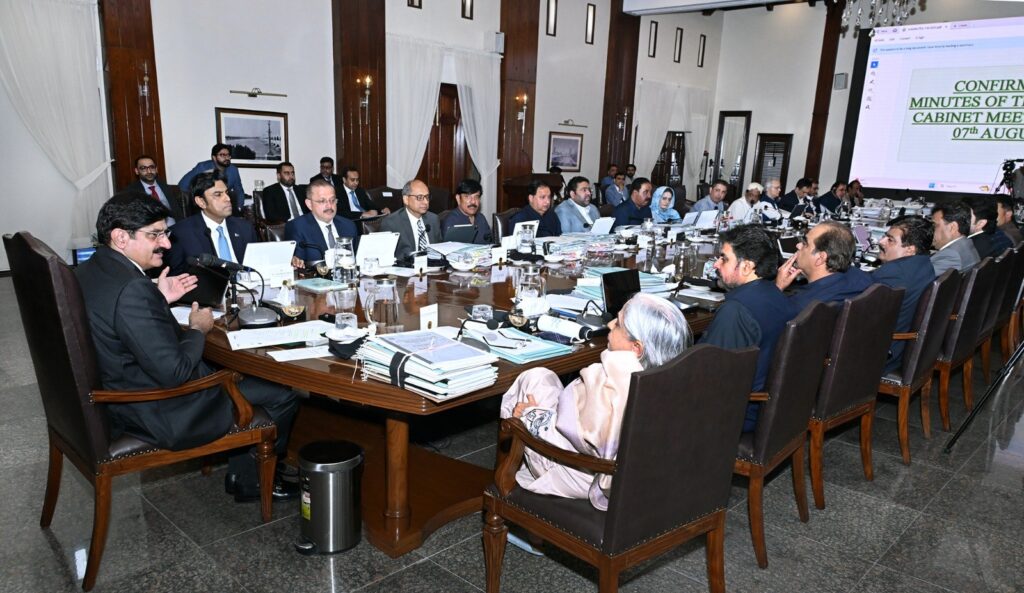Staff Reporter

Karachi: Sindh Chief Minister Syed Murad Ali Shah, presiding over a key cabinet meeting, reviewed the province’s flood situation and praised coordinated departmental efforts, while the cabinet approved major reforms in financial management, correctional facilities, judicial processes, culture promotion, agriculture inspection, taxation reforms, and road safety.
The meeting, held at CM House, was attended by provincial ministers, advisers, special assistants, Chief Secretary Asif Hyder Shah, Principal Secretary Agha Wasif, Chairman P&D Najam Shah, and senior officials.
Flood preparedness & relief response
At the outset, the chief minister briefed the cabinet on flood conditions, noting Sindh had been under threat for six weeks. The first wave brought 534,000 cusecs at Guddu Barrage on August 24, followed by 481,000 cusecs at Sukkur and 273,000 cusecs at Kotri. A second wave peaked at 635,000 cusecs on September 15. Despite forecasts of up to 1.1 million cusecs, timely mobilisation ensured control.
Only 17 of 528 planned relief camps were activated, assisting 192,122 people. The Health Department treated 134,240 patients at 145 medical camps, while the Livestock Department vaccinated 1.6 million cattle. Mr Shah lauded Irrigation Minister Jam Khan Shoro and Irrigation Secretary Zarif Khero, and ministers, MPAs, and district administrations for their field presence and collective efforts. He cautioned that climate change could trigger earlier and more severe monsoons next year, stressing preparation in line with “climate realities.”
Financial reforms & grassroots empowerment
Amendments to the Sindh Financial Rules, 2023 and Delegation of Financial Powers Rules decentralise scrutiny of arrears claims, empowering departmental committees to cut delays. Claims older than 10 years will still require Finance Department approval.
In a landmark step, financial autonomy has been extended to 34,106 schools through cost centres, allowing headteachers to directly access operational funds.
Mukhtiarkars will also gain financial powers under a pilot land digitisation programme in Matiari and Sukkur, enabling up to Rs 0.2 million in expenditures. The CM said this mirrors earlier reforms that empowered SHOs and will strengthen service delivery at the grassroots.
Correctional, Judicial
The cabinet notified the newly built District Prison & Correctional Facility, a 250-inmate facility, in Thatta under the Sindh Prisons & Correctional Services to reduce overcrowding.
Thirteen Anti-Terrorism Courts were redesignated as Special Courts to handle narcotics-related cases, while District & Sessions Courts and Judicial Magistrates were given interim powers until dedicated courts are established.
Culture and Tourism Mandate Expanded
The Culture, Tourism, Antiquities & Archives Department was granted an expanded role, including global promotion of Sindhi culture, regulation of tourism services, vocational training, digitisation of manuscripts, archaeological preservation, and language promotion. It will also oversee the Sindhi Language Authority, Sindh Tourism Development Corporation, and Sindh Board of Film Censors.
Agriculture and Taxation Reforms
The cabinet approved the procurement of 10 mobile testing vans worth Rs 99.960 million under the scheme Mobile Testing Units for Inspection, to improve calibration and spot verification of weights and measures. Daily inspections will rise from 10–12 to 30–35, with district teams working under deputy commissioners.
Tax base broadening
To broaden the tax base, the Sindh Revenue Board (SRB) was authorised to sign MoUs with FBR, PRAL, and SECP for data-sharing and company registration integration. Nine amending notifications were also approved to streamline classification codes without revenue implications.
Transport safety:
The cabinet approved a proposal to establish 10 Heavy Vehicle Fitness Centres across Sindh. Five centres will be built in Karachi and one each at the divisional headquarters.
Using advanced European testing equipment, the initiative aims to modernise transport safety, reduce accidents, and improve compliance. The CM directed the Transport department to invite applications from the interested/professional parties and hire one of them on merit.
By combining climate resilience, financial empowerment, judicial reforms, cultural promotion, agricultural oversight, tax digitisation, and road safety, Sindh Chief Minister Syed Murad Ali Shah signalled a broad-based commitment to transparent governance, grassroots empowerment, and sustainable development.























